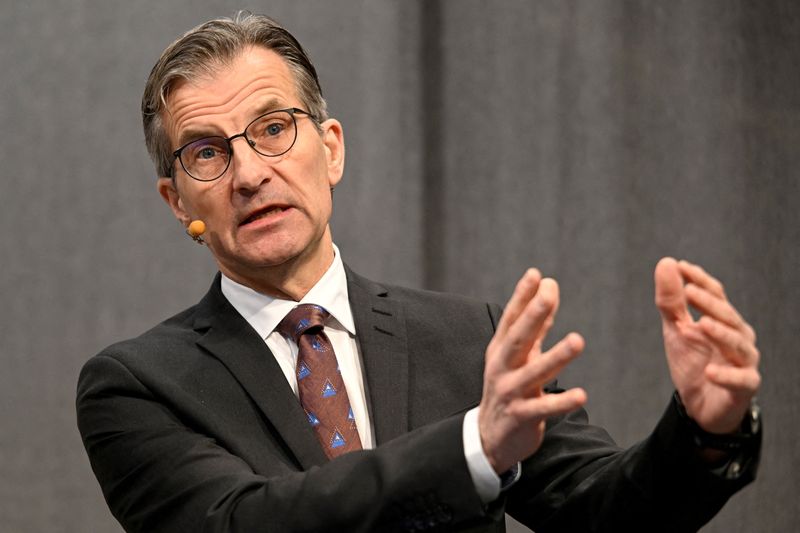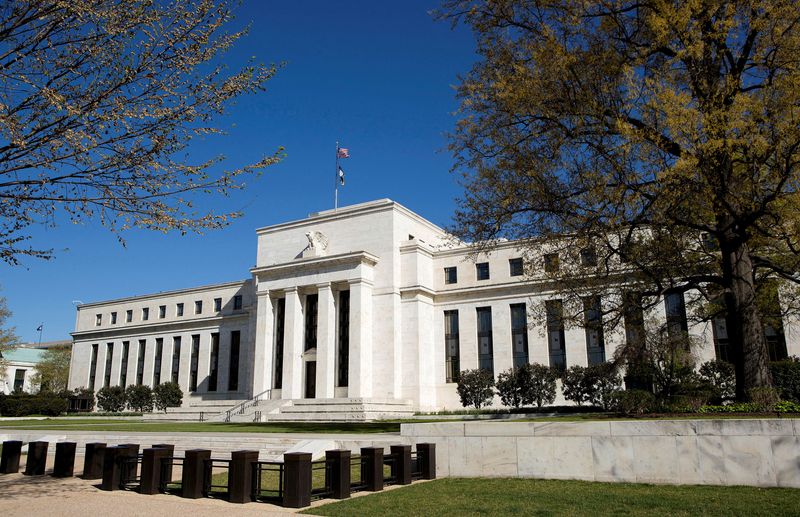LONDON (Reuters) - Inflation signals from the United States, Australia and Japan should be in focus in the coming days following a deluge of central bank meetings that included a historic Bank of Japan rate hike.
Sweden's Riksbank could add to drama around who cuts rates now that Switzerland has kicked off easing among big central banks and Europe's IPO wheels are turning.
Here's your week ahead primer in world markets from Lewis Krauskopf in New York, Rae Wee in Singapore, Anousha Sakoui and Dhara Ranasinghe in London, and Simon Johnson in Stockholm.
1/ INFLATION INTRIGUE
A March 29 U.S. inflation reading is critical for markets after the Federal Reserve stuck with a view for rate cuts this year, even with a stronger economic outlook.
The February Personal Consumption Expenditures Price index is expected to show a 0.4% monthly increase, according to a Reuters poll. January's PCE index rose 0.3%, while the annual increase in inflation was the smallest in three years.
The Fed just upgraded its view on inflation - projecting that the PCE index excluding food and energy would rise at a 2.6% annual rate by year-end, compared with 2.4% in its December projections. It also lifted 2024 economic growth estimates.
Any suggestion in the data that inflation is picking up could dash hopes that Fed easing will start soon, with a go-slow approach likely to continue.
2/ STILL VIGILANT
Just as the Reserve Bank of Australia (RBA) thought inflation was finally coming to heel and the time was ripe to tone down its tightening bias, blowout employment figures have delivered a nasty shock.
The RBA will likely watch Wednesday's inflation print for any upside surprises, given February's data will capture more price changes for a range of services - which has been declining at a slower pace than for goods.
Across Asia, any further easing of inflation in Singapore and neighbouring Malaysia is unlikely to significantly sway policymakers, who are expected to keep monetary policy unchanged for some time.
Tokyo's consumer price figures caps off a data-light week for Japan on Friday. That may be met with less excitement given that the Bank of Japan, has finally now hiked rates for the first time in 17 years.
3/ HEY JUNE!
Traders love a bit of excitement, and there has been plenty lately - a BOJ rate hike and a surprise Swiss cut.
The Swiss move, plus the Bank of England's hint at easing, means it is game on for June rate cuts from other big central banks. Data and central-bank speak in coming days will be watched closely.
The question is the U.S. Fed. It is sticking with a plan for three rate cuts for now, but strong data and sticky inflation could derail that.
Where does that leave investors? They favour government bonds in Europe and selling currencies where rate differentials with the Fed are opening up.
No surprise that the Swiss franc slumped after Thursday's SNB cut and even the buoyant pound took a knock from a dovish BoE.
4/ SOMEWHERE IN STOCKHOLM
Sweden's central bank, the world's oldest, is expected to keep its key rate unchanged on March 27. But it could announce that a cut, the first since it began tightening policy in spring 2022, is nearing.
Headline inflation has slowed to near the Riksbank's 2% target and growth has ground to a halt as households and businesses struggle with rates at over 15 year-highs.
In February, the central bank said rates had peaked and that it could even start to ease policy in the first half of 2024.
Rate-setters remain worried, however, about the risks of setbacks - particularly the chance of a weaker Swedish crown if the Riksbank gets out of step with the ECB and U.S. Federal Reserve.
As a result, markets see a first rate cut in May or June.
5/ IPO WHEELS TURN
The launch of two of the biggest European initial public offerings of the last 12 months is in traders' sights. The market wants some equity market success to unlock a vital cog in the financial system and spur more dealmaking. CVC's perfume retailer Douglas raised around 850 million euros ($922.93 million). It priced its shares at bottom of an indicated range. They plummeted more than 12% on their debut on Thursday.

But skincare company Galderma priced its 2.3 billion swiss franc ($2.56 billion) IPO at the top of an indicated price range and soared on its first day trading Friday.
A good performance might help other companies follow suit, including CVC itself. That should help release pressure building on private equity firms needing to exit investments, return capital and deploy funds.
(Graphics by Prinz Magtulis, Pasit Kongkunakornkul and Vineet Sachdev; Compiled by Dhara Ranasinghe; Editing by Alison Williams)
